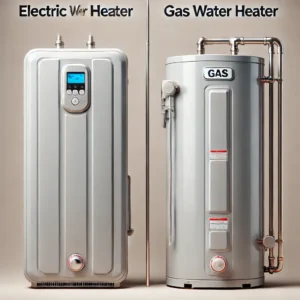Electric vs. Gas Water Heaters play a crucial role in modern households, providing the hot water necessary for daily activities. Deciding which type to install can affect everything from your energy bills to your overall home efficiency. Below, we break down key information, common concerns, and frequently asked questions to help you make an informed choice.
Key Information About Electric vs. Gas Water Heaters
- Upfront Costs: Electric heaters usually cost less to purchase and install, while gas heaters may offer long-term savings if natural gas rates are low.
- Efficiency & Recovery Time: Gas heaters typically heat water faster, but electric models can be paired with clean energy sources for eco-friendly usage.
- Maintenance & Safety: Electric units generally require less maintenance and pose fewer combustion risks, while gas heaters need proper venting and regular checks.
- Environmental Impact: Electric options can leverage renewable electricity (wind, solar), whereas gas heaters rely on fossil fuels but may qualify for energy rebates in some regions.
Electric Water Heaters: Pros & Cons
- Less Expensive to Install: Often cost less upfront, making them budget-friendly.
- Parts Readily Available: Simpler mechanisms mean easier access to repair components.
- Safer Than Gas: No combustion or fumes, reducing potential hazards.
- Newer Energy-Saving Options: Heat pump water heaters can outperform many gas models in efficiency.
- Potential for Clean Energy: Wind or solar power from certain utilities can make these more eco-friendly.
- Longer Recovery Times: May heat water slower, which can be an issue for larger households.
- High Electrical Demand for Tankless: Electric tankless units can use significant electricity during peak use.
Gas Water Heaters: Pros & Cons
- Operate During Power Outages: Basic models can deliver hot water even if your electricity goes out.
- Need Combustion Air: Adequate ventilation is crucial for safe operation.
- Requires Proper Exhaust Venting: Exhaust gases must vent outdoors, which can add complexity to installation.
- Fume Risk: Improper setup or maintenance can lead to dangerous leaks or fumes.
- Potential Rebates: Some regions offer incentives for high-efficiency gas heaters.
- Higher Maintenance: Burners and vents need regular checkups to avoid issues.
- Future Regulations: Some areas may limit or phase out new gas water heater installations.
Common Concerns and Feedback
When choosing between electric and gas water heaters, homeowners often discuss:
- Installation Costs vs. Long-Term Savings: Balancing immediate budget concerns with potential future energy expenses.
- Environmental Footprint: Electric heaters powered by renewables can reduce carbon emissions, while gas remains reliant on fossil fuels.
- Recovery Rates: Gas offers quicker heating, yet electric models with proper capacity can meet most household needs.
- Safety & Maintenance Needs: Electric units are simpler, but gas systems may need professional checks more frequently.
Sharing experiences—both positive and negative—can help others decide which heater is best for their home.
Frequently Asked Questions (FAQs)
Q1: Which type of water heater is cheaper to run?
It depends on local utility rates. If electricity is pricey in your area, a gas heater may offer savings, and vice versa.
Q2: Are there energy rebates available for water heaters?
Yes. Some states or utility companies offer rebates for installing high-efficiency gas or electric models. Check local resources to find current incentives.
Q3: Do electric heaters really heat slower than gas heaters?
In general, yes. Gas units often have faster recovery times. However, modern electric models—especially heat pumps—can be surprisingly efficient.
Q4: How long does a typical water heater last?
Most models (electric or gas) can last 10–15 years with proper maintenance. Regular flushing and inspections can extend their lifespan.
Q5: Should I consider a tankless model?
Tankless heaters save space and can provide continuous hot water, but electric tankless units may draw a lot of power during high usage.
Share Your Experience with Water Heaters
- ⭐ Rate the Heater: Provide a 1–5 star rating based on your satisfaction.
- ✍️ Write a Review: Share details about installation, performance, and any challenges faced.
- 📷 Upload Photos: Show off your setup or highlight any issues encountered.
Your feedback can help others make a better buying decision!
Disclaimer
This content is provided for informational purposes only. We are not affiliated with any specific water heater brand, manufacturer, or utility company. All opinions and advice expressed here are our own, intended to help homeowners make informed decisions about their hot water systems.



0 comments